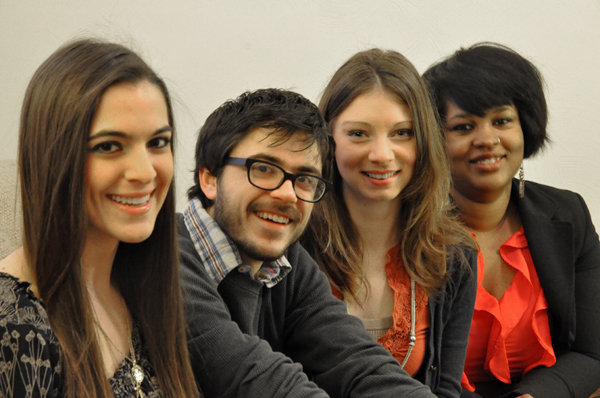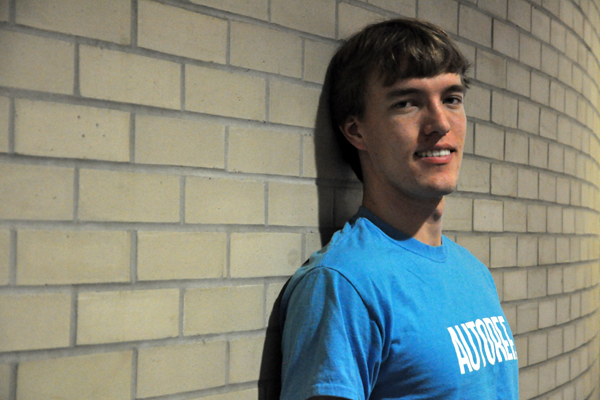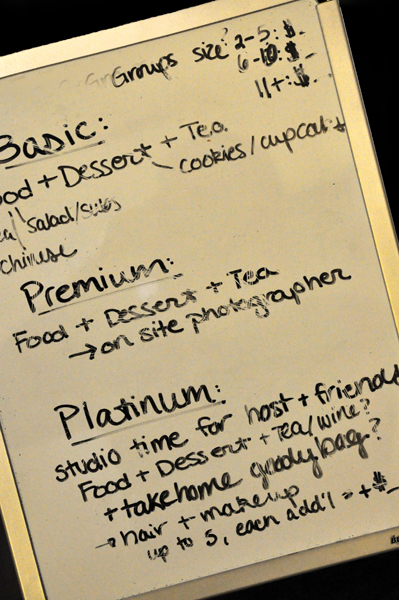This story was published first on sister publication Pop City.
“It’s a joke in the office that I have a new idea for a business every week,” says Andrea Wetherald, 24, of Highland Park.
But at least one of her ideas, conceived right in the office, is no joke at all. Share Closet is an app and website that will let people upload images of their clothes, shoes and accessories to share with their inner circle, and to trade or sell to other Share Closet friends. Wetherald and colleague Sara Longo, 23, of Allison Park, met at work in the area’s VA hospitals, where they conduct a smoking cessation study for the University of Pittsburgh. They had the idea for Share Closet after finding out they were the same size and exchanging clothes themselves.
“We had talked about sharing outfits but not wanting to bring whole bags of clothes to work,” Longo says.
Now the site and app are set to debut later in 2013. Longo and Wetherald are just two of a new breed of young Pittsburgh entrepreneurs — some still in college — who hope to make a mark on the world. They are learning and conducting their business here and, so far, staying put — or even drawing their colleagues here to stay.
Longo is a lifelong Pittsburgher and a former biology major at Allegheny College. Wetherald “grew up in a lot of places,” she says, and moved to the city simply because she liked it, and could use her social worker’s license here. When she realized her latest business idea had potential, she took a course through the Center for Women’s Entrepreneurship at Chatham University, run by the Ewing Marion Kauffman Foundation. There, she worked on the Share Closet concept, designing a revenue model, calculating the desired number of employees, and learning how to talk the language of potential investors.
As with so many online business ideas today, this one is a social network as well. “We really believe that people were not meant to go through life alone,” says Wetherald. “Sharing builds stronger relationships. We believe opening your closet is a really unique way to open your life to your friends.”
Share Closet users will create their own virtual closets. Borrowers get to set their own borrowing policies about washing and returning items, and traders can trade on their own terms as well.
After conducting a survey about clothes sharing on college campuses in Pennsylvania and Ohio, Wetherald says, the pair found that 80 percent were already sharing. The biggest barrier? “It’s awkward to tell my friends when I want it back,” she says. Share Closet takes care of that with an online reminder.
Right now the two women have hired a third team member — Erica Weston, 25, who is responsible for Share Closet’s marketing — are seeking investors and already brainstorming about the future: What if they wanted to add specific categories of household items, such as camping gear? Would that work?
They are fairly confident about the future of Share Closet 1.0, in any case. They know their customers, after all; they are their customers: young women. Of course, says Wetherald, she wouldn’t balk if, say, Eddie Izzard signed up, looking for an outfit for his next standup gig.
“Share Closet is for everyone,” she says.
Sequoia Waste Solutions
Four days each week, Charlie Dolan of Fox Chapel is a junior at Villanova University, northwest of Philadelphia. But on Fridays, weekends and during the summer, he’s right here, working as the technology director and co-founder of Sequoia Waste Solutions.
Sequoia Waste doesn’t own garbage trucks or landfills or recycling sites. Dolan believes the biggest thing going to waste in the waste management industry is good information, and that’s what Sequoia provides.
“There’s a whole lot of data going into this waste management industry that no one is paying attention to,” Dolan says. Sequoia aims to help businesses take better advantage of existing waste management and recycling resources, and to find new ones. Not all companies or building managers have time to review their waste disposal contracts in the detail that Sequoia provides. The company aims both to lower companies’ costs and reduce the amount of waste going into the ground.
Sequoia already has seven full-time employees (including brother Brian Dolan, Sequoia’s vice president of business development) and several interns, all in Pittsburgh. It is doing business here and in about 11 other states, with “hundreds” of clients, Dolan says.
Dolan, who attended Central Catholic High School in Oakland says “My entire life has been taking apart computers and building computers for fun. You’d be surprised what you can do when you stop playing videogames and just work.”
Now 20, he is majoring in management information systems. Simultaneously attending college and running his business are “a great synergy,” he explains. When studying contract negotiation, for instance, he is able to bring up his own experience. And in a class focused on CRM — customer-relations management — he was able to present his own CRM system. The CRM market is a massive one that’s worth $36 billion so there are hundreds of different solutions available to businesses. On top of this, CRM systems like Dynamics are able to integrate with marketing solutions like Marketo (Read more about this here). So, it’s fair to say that Dolan had lots of inspiration when designing his very own CRM.
Today, Sequoia Waste is about to close on a round of funding. Dolan can’t give specifics, but says “it is going to be a very substantial padding to our tech budget.”
The company is also finishing an iPad app. “The app will allow our salesmen to literally walk up and down city streets, gathering important metrics regarding an establishment’s waste stream, take photos of the waste and any recycling receptacles, and make a proposal, complete with an accurate savings percentage, to the prospect — all within three to five minutes on the device,” Dolan says. Clients also will use the app to get an exact inventory of how much it costs to dispose of all their waste.
“Our Pittsburgh office will continue to grow into the true ‘hub’ of the waste industry,” he adds. “We expect to seriously expand our technical capabilities with this round of funding. That means [hiring] data analysts, developers, engineers, graphic & UX specialists, and web developers.” (Send resumes to resumes@sequoiawaste.com, he adds.)
AutoRef
Some people thrive on haggling with salespeople. Todd Medema knows his most eager customers will come from those who hate to negotiate.
Medema, 20, a junior at Carnegie Mellon University, is co-founder and COO of AutoRef. The company makes finding the best car deal easier and much less of a hassle.
Medema grew up in California, and still splits his time between there and Pittsburgh. In high school, he says, “I was good with technology, and enough people would come to me and say, ‘Help me fix this!’ So it occurred to me: I should charge for this. I had a business sense without being aware of it.” He opened his business at the beginning of his freshman year, calling it Laser Forge Studios.
“That’s what happens when you have a 14-year-old name a company,” he says. “When I came to CMU, I kept my eye out for entrepreneurship going on.” As a freshman there, he became the youngest Fellow of .406 Ventures, a two-year program that brings together entrepreneurial students from around the East Coast.
Today, AutoRef is national, featuring more than three million cars from 5,000 dealerships across the country, and have sold more than 400 already through the site since August. They are in negotiations for funding with several investment groups, although Medema jokes that sometimes it’s tough to explain the value of AutoRef to investors. “All they do is haggle and negotiate,” he says. “‘Of course we haggle for our car,’ they say. I said, ‘You are not our target market.'” All seven employees are in Pittsburgh; the company’s success has even persuaded one of Medema’s two co-founders to move here.
Ironically, Medema doesn’t yet have a car himself — but that’s just because he’s being prudent. And because he is anticipating his company will be a hit. “I do not have enough money to buy a car,” he says, “but as we continue to grow and be successful, I am definitely buying a Lotus Elise.”
Overcomeadhd.org
Tom Menditto runs the Pittsburgh Young Entrepreneurs Meetup, whose members are so busy it is hard to find time to actually meet, he says. But Menditto, 26, of Squirrel Hill, and an entrepreneur himself, know this much about group members: “Young people are starting not to accept the typical process of college, more college, more college, and then a job, then retirement as the only path.”
Menditto’s own path was far from standard. “I have only had one real job my whole life,” he says.
He began working at age 14, and has built websites, worked in construction and had a successful eBay business.
He began the Dao Center six years ago as a school and service company, partnering with different wellness centers to offer such things as Tai Chi training to nonprofits and corporations. “I was doing all this different stuff, but it wasn’t my passion,” he says. “This is the first thing that resonated with my heart.”
What he is focusing on today, he reports, is being a coach for kids with ADHD, and their families. “I felt like I can’t not help them,” he says, “because I’ve been there. As a youth, I was pretty much one of these kids. I went through a really tough childhood — low self-esteem, suicidal, you name it.” Medication helped, but it isn’t the only answer, he feels. He celebrates that he has been medication- and symptom-free for the past 14 years.
“My mother, my brother, and other people in my life started exposing me to different kinds of modalities,” including meditation and yoga, he says. Tai chi helped with what he calls his “transformation,” and today he is about to launch Overcomeadhd.org to offer many of his own practices, coaching and techniques to others. He has long been offering one-on-one coaching, and is now about to offer it to groups as well.
“Every day, I work with families,” he notes. “I know a lot of kids are getting over-medicated, over-labeled … It breaks my heart. I was there and I could still easily be there. I’m not against medication and western psychology. I believe we can all work together.”
“There are a lot of start ups, and a lot of young people looking for another way” to live and make a living, he concludes. “There are also just as many that feel defeated by the difficulties of it. In my experience, young people can have a tremendous edge, because of their intimate knowledge of technology, and ability to easily learn new things …
However, he adds, the coaching that entrepreneurs “need to become successful is something that comes from the old school of entrepreneurship, and I hope young people pay very close attention to that.”
MARTY LEVINE is the editor of Pop City’s For Good section. Send feedback here.



